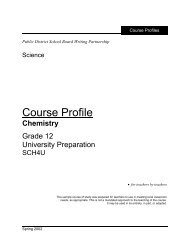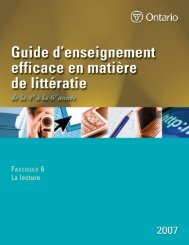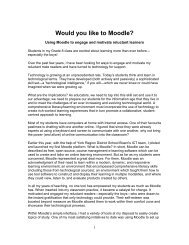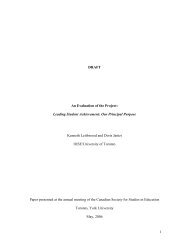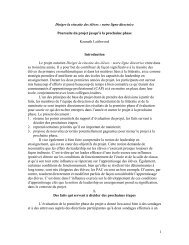Course Profile - Curriculum Services Canada
Course Profile - Curriculum Services Canada
Course Profile - Curriculum Services Canada
You also want an ePaper? Increase the reach of your titles
YUMPU automatically turns print PDFs into web optimized ePapers that Google loves.
Coded Expectations, Philosophy: The Big Questions, Grade 11, Open,<br />
HZB3O<br />
Philosophical Questions<br />
Overall Expectations<br />
PQV.01 · describe precisely and clearly three (or more) of the big questions of philosophy;<br />
PQV.02 · summarize their own or others’ answers to these questions, and give reasons in support of the<br />
answers.<br />
Specific Expectations<br />
PQ1.01 – compare two or more answers to three (or more) of the big questions of philosophy;<br />
PQ1.02 – give appropriate reasons for their own or others’ answers to three (or more) of the big<br />
questions of philosophy (e.g., What is happiness? Can a life of self-indulgence be meaningful?);<br />
PQ1.03 – summarize some arguments for and against answers to three (or more) of the big questions of<br />
philosophy (e.g., arguments for and against the claim that morality is objective);<br />
PQ1.04 – describe the strengths and weaknesses of the main arguments used to defend answers to three<br />
(or more) of the big questions of philosophy (e.g., arguments for and against the claim that science is<br />
the best way to know what really is);<br />
PQ1.05 – compare philosophical approaches to some of the big questions with non-philosophical<br />
approaches (e.g., philosophy and religion regarding the question “Does God exist?”, philosophy and<br />
social sciences regarding the question “What is human nature?”).<br />
Philosophical Theories<br />
Overall Expectations<br />
PTV.01 · summarize the ideas of some famous philosophers with respect to one or more of the big<br />
questions of philosophy;<br />
PTV.02 · describe the strengths and weaknesses of the responses to some of the big questions of<br />
philosophy defended by some major philosophers or schools of philosophy.<br />
Specific Expectations<br />
PT1.01 – compare answers to some of the big questions by different philosophers (e.g., Mill and Kant<br />
about good and evil, Descartes and de Beauvoir about human nature);<br />
PT1.02 – describe the differences in approach to three (or more) of the big questions of philosophy by<br />
some major philosophical schools (e.g., Thomism and existentialism regarding the meaning of life,<br />
rationalism and empiricism about human knowledge, feminism and libertarianism about social<br />
justice);<br />
PT1.03 – describe important similarities and differences among some of the world’s philosophical<br />
traditions with regard to three (or more) of the big questions (e.g., Confucianism, Platonism,<br />
Buddhism, materialism).<br />
Page 17<br />
• Philosophy: The Big Questions - Open



